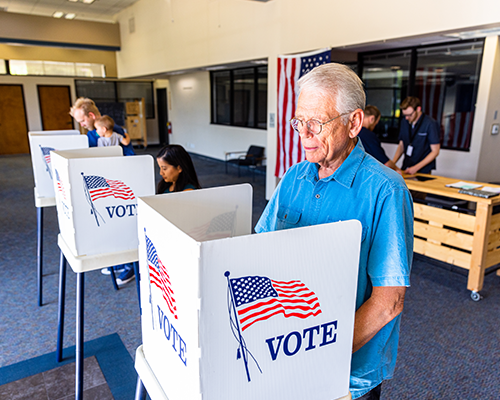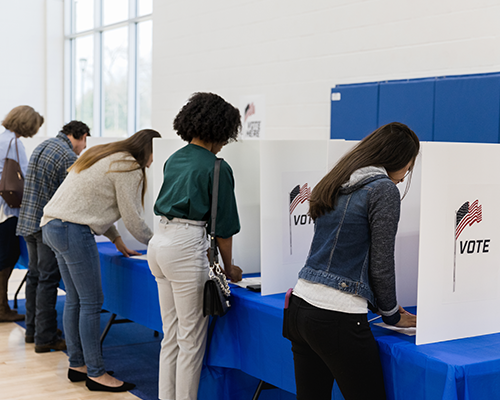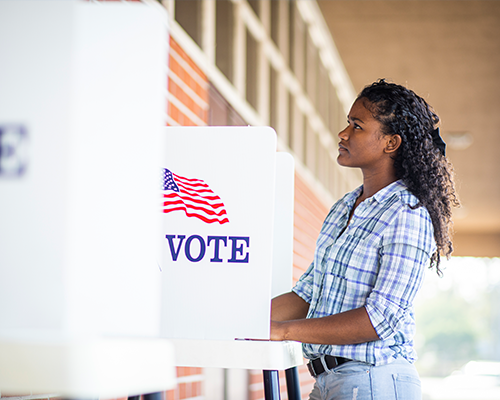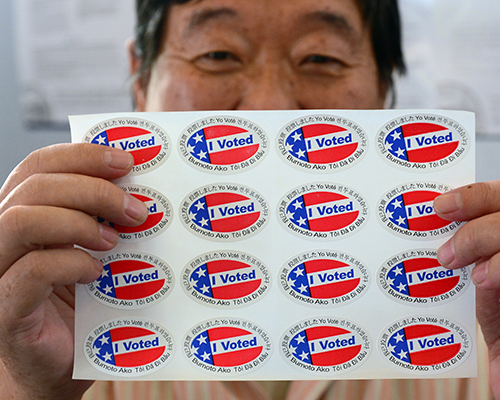
How do you
get & cast a ballot?










How does Michigan make
absentee voting safe & secure?
Who Can Vote Absentee in Michigan?
All registered voters in Michigan may vote absentee – they do not need to offer a reason such as travel or illness in order to apply for an absentee ballot. This is also referred to as “no excuse” absentee voting. In order to vote by mail, you must request an absentee ballot online or from your local clerk’s office.

Do You Have To Apply To Get An Absentee Ballot?
Yes. Absentee ballots are sent only to Michigan registered voters who apply for them.
Michigan elections officials recommend voters apply 2 weeks before Election Day, to avoid mail and processing delays.
While some rumors to the contrary circulated in 2020, the Republican-controlled Michigan Senate Oversight Committee has stated that they saw no evidence supporting the idea that absentee ballots were sent to voters who did not apply for them.
As a security measure, a voter’s ballot application must include:
- their full legal name,
- a MI driver’s license or ID number,
- their date of birth, eye color,
- the last 4 of their SSN, and
- their mailing address.
Once a voter applies to vote by mail, their citizenship status, eligibility to vote, and personal information is verified. Election clerks check the signature on an absentee ballot request against signatures they have on file to verify the identity of every voter.
Voters must submit an absentee application form by 5 pm on the Friday before the election (although it is recommended that you apply at least 2 weeks before Election Day) to receive an absentee ballot.
If a voter wishes to get an absentee ballot and Election Day is less than two weeks away, they can apply for an absentee ballot in person at their local clerk’s office.
After a voter’s application has been processed and approved, their local clerk’s office mails them a trackable, secure mail ballot via USPS.
What should I know about my absentee ballot?
An absentee ballot contains (1) the ballot, (2) a secrecy sleeve to keep your vote confidential and secure, and (3) an outer green and white envelope, with printed instructions for completing the ballot.
Voters must follow the instructions provided when filling out their ballot. Ballots can be rejected for being delivered after election day or if they include a signature that appears different than the one on file with the voter’s clerk (the signature from your driver’s license, state ID, or voter registration application).
Michigan’s constitution gives all voters the right to cast their absentee ballot starting 40 days before Election Day.
After a voter has filled out their absentee ballot, they must insert it into the secrecy sleeve, carefully following the instructions provided with the ballot. Voters who make a mistake while filling out their ballots must fill out an official form and request a new ballot from their clerk’s office. Clerks have a system in place to ensure that only the new ballot is counted. They exclude the original ballot from their tally.
Voters can return their completed ballot:
- by mail,
- by depositing it in a secure ballot drop box, or
- in person at their local elections office or an early voting site.

Mailing in Absentee Ballots
Absentee ballots come with a return envelope that is pre-addressed to the voter’s local clerk’s office. It includes their return address, as well as appropriate postage. All ballots are trackable as they journey back to the clerk’s office, if a voter opts in to this service.
Voters are advised to put absentee ballots in the mail at least 2 weeks before Election day to avoid potential mailing delays. All absentee ballots must be received by the voter’s local clerk’s office by 8 pm on Election Day to be counted.
Voting by mail has been used in the U.S. since the Civil War and has a long history of being safe and secure. In 2018 Michigan voters overwhelmingly adopted a constitutional amendment expanding the use of mail-in ballots.
Returning an Absentee Ballot via Secure Drop box
Ballot drop boxes are clearly labeled, securely locked, and in a public, well-lit area with good visibility.
Voters must insert their ballot into an official, marked drop box by 8 pm on Election Day for it to be counted. Local election clerks and their staff regularly collect absentee ballots from drop boxes and securely transfer them to the clerk’s office, ensuring chain-of-custody of the ballots is maintained.
Drop boxes were first permitted in 2020 under a Republican-controlled state legislature. In 2023, with bipartisan support, the state legislature affirmed the use of drop boxes and made standard security requirements for them across the state.
Ballot drop boxes in Michigan are clearly labeled, securely locked, and in public, well-lit areas with good visibility. Only a municipality’s clerk or clerk’s staff may collect and securely transfer ballots from the drop box to the clerk’s office. Many drop box locations are video monitored by the local clerk’s office as well.
A Republican-led investigation in the Michigan Senate, and numerous fact checks, found no evidence of fraud with drop boxes.
Returning an Absentee Ballot in Person
Voters may turn in a ballot during open hours at an early voting site up until the Sunday before Election Day, or to their local elections office by 8 p.m. on Election Day.

Can you vote in person if you requested an absentee ballot?
All people who applied for and received absentee ballots are recorded on a registration list. If they submit their ballot and it is accepted and processed, that is also recorded. A voter who has received and voted their absentee ballot will be flagged if they show up in person and try to vote at the polls. It is illegal to vote twice in Michigan, and the state has many checks and oversights in place to ensure this does not happen.
If a voter requested an absentee ballot and then also shows up to vote in person, they can do one of two things:
- If they bring their absentee ballot with them and “spoil” it, they can then cast an in-person ballot that will be tabulated along with other cast votes. Their “spoiled” absentee ballot will not be counted.
- If they do not have their absentee ballot with them, they can cast an in-person vote, but may have their in-person ballot set aside as a provisional ballot. That ballot will only be counted as a vote once an election worker can confirm that the voter did not cast their absentee ballot.
- If the person shows up as having already cast their absentee ballot, they will not be permitted to vote in person.
Returning Others’ Absentee Ballots
Michigan voters are allowed to turn in the ballots of anyone who lives in their household and of the following family members, who are considered immediate family members under Michigan law: father-in-law, mother-in-law, brother-in-law, sister-in-law, son-in-law, daughter-in-law, grandparent, or grandchild.
Beyond this, it is a felony in Michigan to possess another voter’s ballot, regardless of whether it has been voted or not.
No. Some people have used the term “ballot harvesting” to suggest that people are returning large numbers of ballots for other people or for people who are dead or aren’t real. This has not been a problem in Michigan and would be illegal if it did occur. There are numerous safeguards to ensure that only legitimate ballots of registered Michigan voters are counted.
Claims of ballot harvesting, like those in the movie 2,000 Mules, have consistently been disproven.
Processing Absentee Ballots
Once the voter’s local elections office receives the absentee ballot, election workers compare the signature on the ballot to the signature they have on file from when the voter originally registered, or from a state ID. They will also check to make sure the voter provided the required information on the absentee ballot envelope. If the signatures do not match or the information provided is inadequate, the ballot will be rejected.
If there is a problem with the signature or the ballot envelope is not signed, the clerk will contact the voter by phone, mail, or email to allow the voter to correct the issue.


How does
in-person voting work in Michigan?
Registered voters have the right to vote in person early or on Election Day in Michigan.
Early Voting
Starting in 2024, all registered Michigan voters will have access to at least 9 consecutive days of early voting in at least one early voting site in their county before Election Day for federal and statewide elections. The early vote period must begin no later than the second Saturday before Election Day and end on the Sunday before Election Day.
Michigan law allows every city and township flexibility to decide whether to offer additional early voting sites, and a voter’s early voting location or locations often will not be the same as their Election Day polling place. In some instances, a voter may have an early voting site in their county, but in a different city or township.
Your local elections office may choose to extend the early voting period and may choose to provide early voting as an option in local elections as well.
Because early voting opportunities vary by municipality, it is important to check when and where you can vote early before you try to cast your vote. Voters can look up their assigned voting site(s) and the hours they will be open before Election Day.
Election Day
On Election Day, voters must vote at their assigned polling place in the city or township where they are registered. Polling stations on Election Day are open from 7 AM to 8 PM.
Does Michigan Require Voter ID?
In order to vote in person, voters will need to either bring photo ID (or an alternate acceptable ID) or sign an affidavit verifying their identity and stating they are not in possession of picture ID at the polling site. Affidavits can be challenged if there is a reason to disbelieve a voter’s attestation. If someone is found to have lied on such an affidavit, their vote is thrown out. It is illegal to lie on such an affidavit, and the voter will also face legal consequences. Instances of someone trying to vote as someone else are extremely rare.

Who Can Observe Michigan Elections Being Conducted?
Anyone may be a poll observer during the Michigan elections process – both during voting periods and while ballots are being processed and tabulated.
Both Republicans and Democrats appoint election challengers, who are permitted at all operational polling locations during voting hours. A challenger, unlike an observer, has the ability to flag issues with the challenger liaison (unless otherwise specified by the local clerk, the challenger liaison is the precinct chairperson) concerning the voting process if they believe an error in administration is occurring. Political parties also appoint observers to watch ballot processing and tabulation.
Learn more on where, when, and how to vote in Michigan elections here.

Does Michigan provide ballots for
military & overseas voters?
Yes. There is also a special type of ballot for a small number of eligible military service members and certain Michigan voters who live overseas. Like all other Michigan voters, to register to receive such a ballot, these individuals must apply and show they meet the relevant criteria requirements to obtain such a ballot.
Eligible military service members and other registered & eligible Michigan voters living abroad are able to vote absentee in federal elections. They must complete a Federal Post Card Application (“FPCA”) or register online.
Once a military or overseas voter applies to vote by mail, their citizenship status, eligibility to vote, and provided personal information is verified. Election clerks check the signature on the ballot request against signatures they have on file to verify the identity of every voter. Registered Michigan voters serving and living overseas are subject to the same signature verification requirements as Michigan voters in the U.S.
Once the application has been processed and approved, the clerk’s office will send the ballot to the voter to fill out and return by mail. In order for the overseas ballot to be processed and tabulated, the ballot must be valid, have a matching signature, be postmarked no later than Election Day, and be received by the clerk’s office within 6 days after Election Day.
It is advised for overseas voters to apply for and return their ballot as early as possible.
